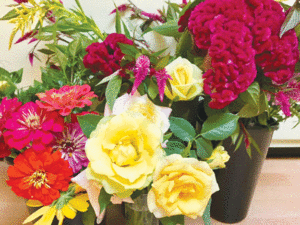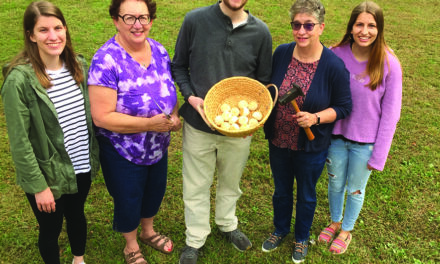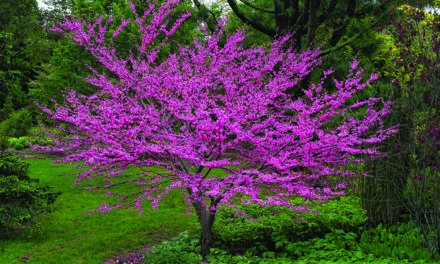
Taking a chance on two hybrid tea rose bushes, Rosa Peace and Henry Fonda as additions to her wildflower and cottage garden favorites Dede Hoopes said she was so happy with the results she plans to add more this season. (Photo courtesy Dede Hoopes)
Roses have a thorny reputation for being tricky to grow, even under idyllic conditions.
Fungus and mildew, black spots, Japanese beetles and foraging deer are just a few of the challenges to be overcome on the way to successfully cultivating the “queen of flowers.”
The Mid-Atlantic’s muggy summers and soil ranging from sandy to clay can be the opposite of ideal.
Environmentally speaking, Delmarva gardeners certainly weren’t promised a rose garden. Yet even here, many can’t resist the temptation to try.
Those who take the plunge and persist can be rewarded with a long, resplendent blooming season.
Thanks to hardy varieties native to the region and the ongoing development of more disease resistant varieties, it’s possible to produce stunning specimens in one’s own backyard.
Since being designated as the American national floral emblem during President Ronald Reagan’s 1987 proclamation, the number of registered rose varieties has blossomed to 35,000, according to Pam Powers, president of the Arlington Rose Foundation in Virginia.
Powers, who has been president of the ARF for five years and a member for 25, was initiated into the risky joys of rose gardening courtesy of her grandmother and mother, who both cultivated the stately blooms.
A Westminster, Md., friend of her mother’s, amateur hybridizer John Smith (one of the top ten in the United States), once produced a variety named in her honor — the Jacqueline Powers — perfectly matching her favorite shade of red lipstick.
Today, Powers grows some of Smith’s newest varieties at home, including Randy Scott, Sunny Sundays, and Babies Blush.
When her mother showed roses competitively, Powers came along to help and learn. Later, her mother returned the favor and assisted at her own competitive showings.
An American Rose Society rosarian (credentialed rose consultant), Powers draws on her years of inherited and first-hand expertise to guide those inspired to try their own hands, starting with the complex array of varieties to choose from, through to planting, pruning, and cultivating a regimen of simple but regular care.
“A lot of people contact me saying they want to grow a real rose garden. To find out what they mean by real, I show them a picture sampler of maybe 100 varieties and ask them to select their 10 favorites,” she said.
From there she can begin to make recommendations.
“People grow roses for all different reasons nowadays; some want the more formal traditional roses with tight centers, some want the fragrance,” she added.
When asked which roses they should grow, Powers replies that there is no set answer.
Knowing that “what appeals to me may not appeal to you,” she urges them to get the roses of their dreams — so long as they suit their lifestyle.
David Austin roses are often the first choice of people wanting exquisite blooms.
“They are ‘the bomb,’” Powers said, “fragrant, heavy petaled, and romantic. But they are not disease resistant or easy care, and are care intensive to prevent blackspot and pests. They work best in periods of little rain. Heavy downpours tend to waterlog the blooms.”
Among those especially well suited to the mid-Atlantic is the native Rose of Virginia; hardy, bright pink, butterfly-attracting and disliked by deer.
Rugoso is another, available in a range of colors, containing 5 and 6 petals, with leathery leaves also unappealing to deer.
The Fairy and Sea Foam varieties are older selections, tend to be fungus resistant, and produce more petals.
The Savannah, among the number of modern roses bred to be fungus resistant, is “quite charming” with more petite blooms. So far, only 250 of the total 35,000 varieties are naturally fungus resistant, she added.
As caretaker to 130 rosebushes at her own home, Powers stresses that simple discipline and adhering to basic gardening practices are the main key ingredients to success.
She also cautions prospective growers to understand that roses advertised as “easy care” are so-called because they aren’t as susceptible to fungus, black spots, and mildew which weaken the rose and make it ugly.
It shouldn’t be misconstrued to mean “no care required.”
Knockout is one of the best known “easy-care” varieties, but Powers advises that these can sometimes be problematic due to unduly crowded planting by less knowledgeable landscapers, leaving them vulnerable to becoming breeding grounds for pests like mites and midge.
Instead, she suggests trying the Carefree Beauty shrub rose, which is more colorful and fungus free.
“Even with ‘easy care’ varieties, you first need to plant them correctly (in a large enough hole, at least 20 inches square), dead head blooms regularly, know their water requirements and water and understand your soil elements (clay or sand).
Pruning, is the most critical spring task of all, ensuring overall health and longevity of the rose bush to remove dead, diseased, dying, spindly and crossing canes for the most productive growth.
Rose bushes are all about energy and forcing it down so that the lower bud eyes emerge from dormancy.
Proper pruning with two simple tools, a by-pass pruner and a folding saw for larger canes, plus a little Epsom salts application, will help the rose regrow its canes, she said.
To that end, ARF sponsors hands-on workshops in garden settings to offer instruction coupled with practice for the most effective learning experience possible.
“Roses are heavy feeders and drinkers. Some of ARF members use shorter lasting liquids more frequently or apply solid organics monthly, notably, Mills Magic Mix, a blend of cotton seed, blood meal, alfalfa meal, fish meal, and proprietary ingredients. Using alfalfa tea we brew in large trash cans will perk up any plant with a growth hormone,” she added.
A crucial first step is to first get your soil pH (acidity/alkalinity level) tested. Optimal pH for roses is 6.25 to 7, she advised.
Powers strives for diversity in her own yard: hybrid teas, minis, miniflora climbers, rugosas, and David Austins, with and without fragrance. “There are some roses that, each year when they bloom, they take my breath away! I always have a new rose in the garden,” she said.
Dede Hoopes, owner of HoopsyDaisy Farm, a fresh cut flower company in Oxford, took a chance and added two hybrid tea rose bushes, Rosa Peace and Henry Fonda to her wildflower and cottage garden favorites repertoire just last year.
She said she was so happy with the results she plans to add more this season.
“There was nothing magical to my choices, I’m afraid; I just knew hybrid tea roses provided great cut flower stems, so I went for colors I liked. Now that I am ‘hooked’ and looking to expand my lot, I am doing more research,” she said.
Hoopes dutifully had her soil pH tested, but the 7.5 alkaline result did not deter her from trying.
“I have been managing it and will do a home test myself this spring hoping its more in check. I had fabulous blooms last season but still want to see a more balanced result,” she said.
As a Certified Bay-Wise demonstration landscape, Hoopes’ rose growing practices reflect her holistic and natural methods.
“In the spring, the roses get compost and bone meal to begin bringing them out of dormancy. Once leaves begin to really form, I start a combination of seaweed and kelp both in the soil and on the foliage, and continue through the summer on a regular basis,” she said.
“I have a drip irrigation system which makes a huge difference — roses want to be hydrated but not wet. If they’re healthy and hydrated, the bests are at a minimum. I also use beneficial insects on my farm — good bugs to fight the bad bugs. That helps too, but roses are still prone to mites, aphids, etc. In the end there are natural home sprays and remedies that can be made,” she continued.
Among the non-toxic solutions suggested by authors Andre and Mark Viette in The Mid-Atlantic Gardeners Guide, are a Cornell University research recommended spray containing 1 tablespoon of baking soda and 1 tablespoon of ultra-fine horticultural oil to 1 quart of water. For Japanese beetles, they advise taking care in removing them not to crush them; this releases pheromones possibly attracting more of the pesky insects, the authors state.
(Editor’s note: Pam Powers welcomes rose-related inquiries at arfinformation@aol.com and pam1powers@aol.com. HoopsyDaisy Farm information is available at hoopsydaisyfarm@gmail.com.)





